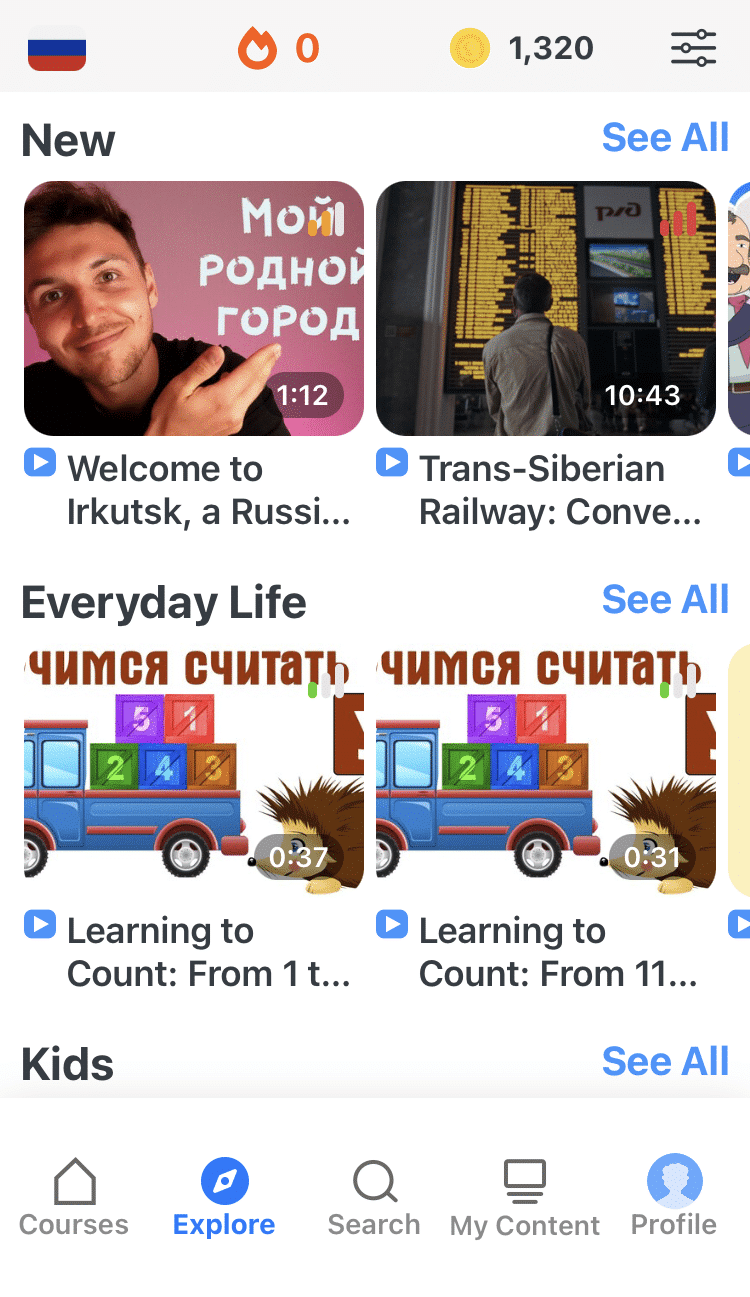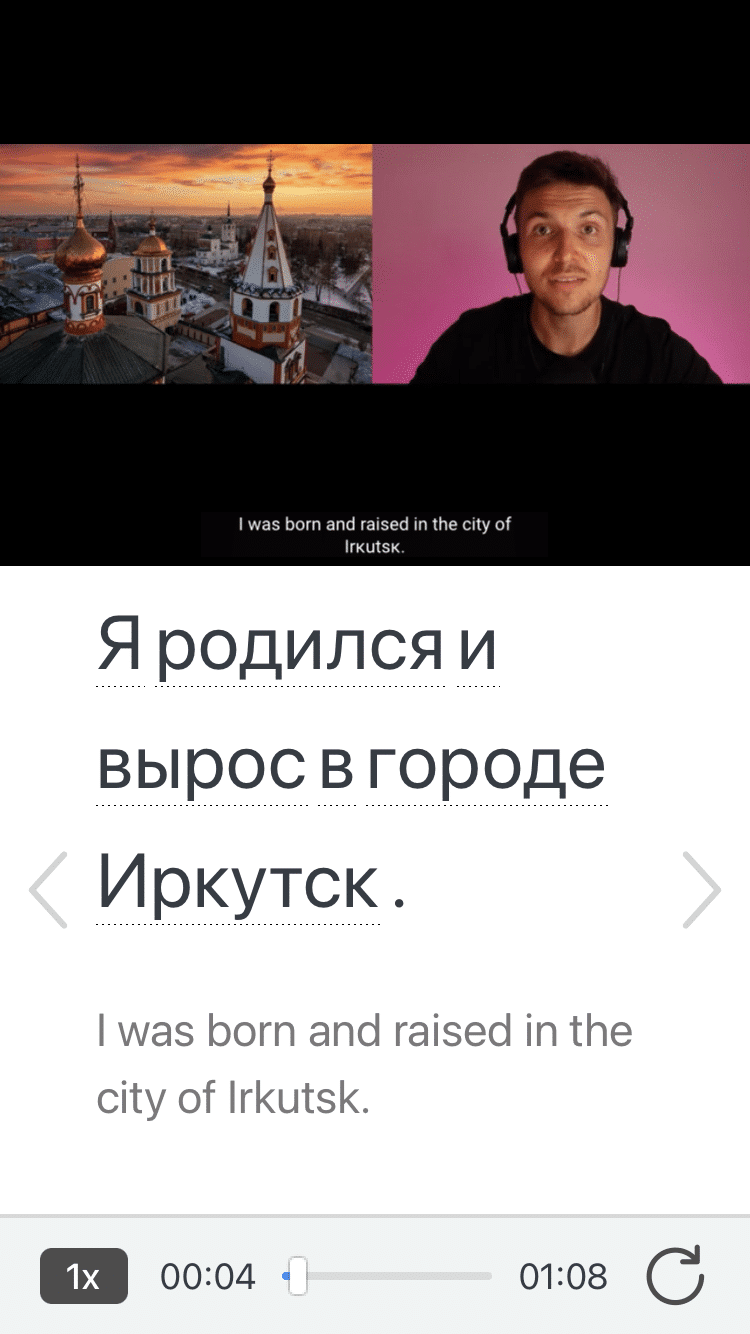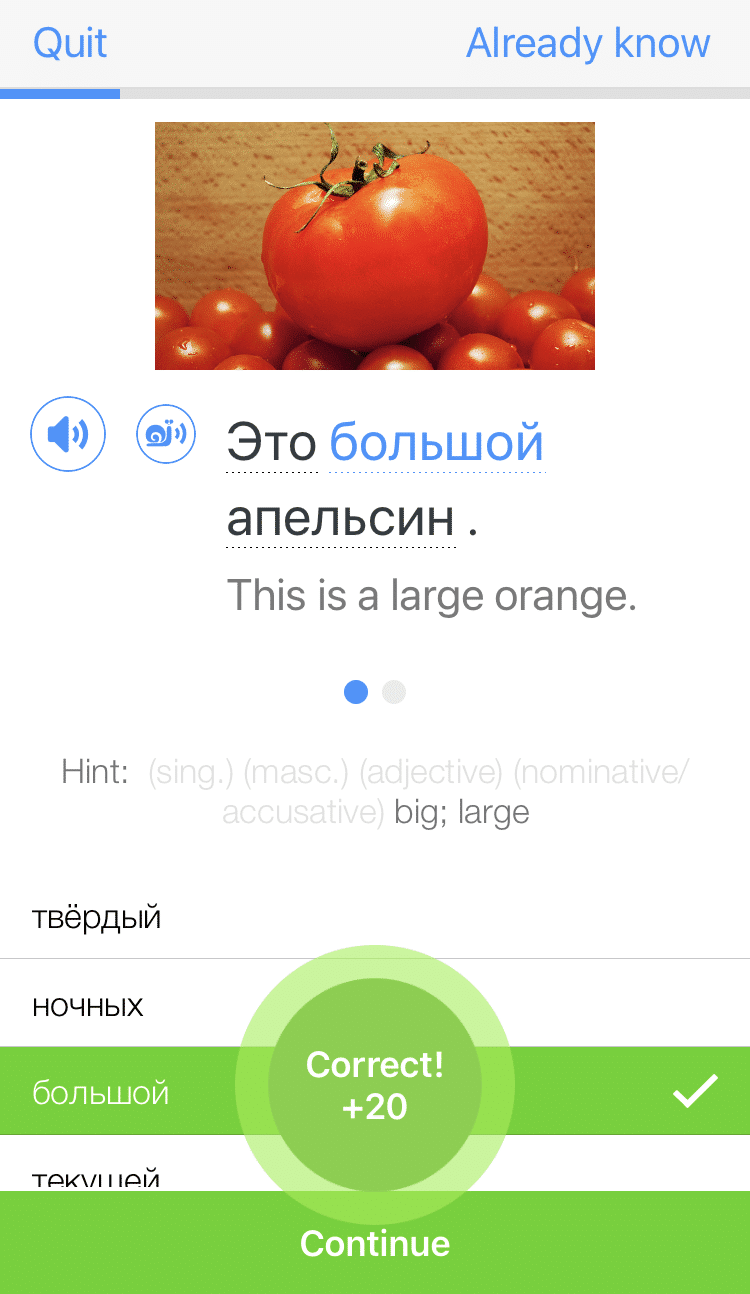
26 Ways to Say Happy Birthday in Russian
Russians love having reasons to celebrate.
At some point or another, as your Russian improves and you make more Russian friends, chances are you’ll get invited to a birthday party.
That’ll give you the opportunity to say happy birthday in Russian—or, at the very least, pick up ways to celebrate birthdays Russian-style.
Here’s the ultimate guide to everything you need to know about celebrating a birthday in Russian. We’ll delve into the standard phrases Russians use to convey пожелания (wishes) for a birthday or any other holiday, as well as customs and traditions surrounding Russian birthdays.
Contents
- 1. С днём рождения — Happy Birthday (Traditional)
- 2. Поздравляю с днём рождения — Happy Birthday (Formal)
- 3. С днём варенья — Happy Jam Day (Very Informal)
- 4. Я желаю Вам… — I Wish You… (Formal)
- 5. Я желаю тебе… — I Wish You… (Informal)
- 6. Ещё раз с днём рождения — Once Again, Happy Birthday
- 7. С прошедшим днём рождения — Happy Belated Birthday (Formal)
- 8. С прошедшим — Happy Belated Birthday (Informal)
- 9. Расти большой, не будь лапшой — Grow Big, Don’t Be a Noodle
- 10. За здоровье — (A Toast) To Your Health
- 11. На здоровье — You’re Welcome (In Response to Being Thanked for Food or Drinks)
- 12. Поздравляю с днём рождения — Congratulations on Your Birthday (Formal)
- 13. С днём рождения тебя — Happy Birthday to You
- 14. Поздравляем с днём рождения — We Congratulate You on Your Birthday
- 15. С праздником — Happy Holiday
- 16. С днём рождения, дорогой / С днём рождения, дорогая — Happy Birthday, Dear
- 17. Пусть этот год принесёт много радости — May This Year Bring You a Lot of Joy
- 18. В этот день пусть сбудется всё, что задумано — On This Day, May Everything You’ve Planned Come True
- 19. Поздравляю с твоим днём — Congratulations on Your Day
- 20. С тобой всегда весело — It’s Always Fun With You
- 21. С наилучшими пожеланиями — With Best Wishes
- 22. Желаю тебе вдохновения и творческих успехов — Wishing You Inspiration and Creative Success
- 23. С днём рождения, замечательный человек — Happy Birthday, Wonderful Person
- 24. Пусть этот год будет лучше предыдущего — May This Year Be Better Than the Previous One
- 25. С юбилеем — Happy Jubilee
- 26. Пусть вокруг будет много улыбок и добрых слов — May There Be Many Smiles and Kind Words Around You
- Birthdays in Russia: Fun Facts and Essential Traditions
- Russian Birthday Songs
- Eating at a Russian Birthday Party
- And One More Thing...
Download: This blog post is available as a convenient and portable PDF that you can take anywhere. Click here to get a copy. (Download)
1. С днём рождения — Happy Birthday (Traditional)
С днём рождения is the simplest and most traditional birthday greeting in Russian. It’s the one that’s most commonly used, and you can use it for a person of any age.
2. Поздравляю с днём рождения — Happy Birthday (Formal)
This is a more formal birthday greeting compared to С днём рождения. If you just found out that it’s your coworker’s special day, for example, and you don’t necessarily have a close relationship with this person, saying this to them can help break the ice!
3. С днём варенья — Happy Jam Day (Very Informal)
This is a fun way of wishing children or very close friends a happy birthday. С днём варенья is a play on words and sounds a bit like С днём рождения .
4. Я желаю Вам… — I Wish You… (Formal)
If you’d like to compose your own wish for the именинник (birthday boy) or именинница (birthday girl) in a formal context, start with Я желаю Вам.
Then, add one of these choices:
- … всего самого наилучшего — all the best
- … здоровья, благополучия, и счастья — health, wealth and happiness
- … успехов во всех начинаниях — success in all your endeavors
- … исполнения всех желаний — that all your dreams come true
- … удачи — good luck
Put it all together, and you’ll have a heartfelt birthday wish.
5. Я желаю тебе… — I Wish You… (Informal)
This is basically the more informal version of Я желаю Вам. You can also cap this off with the phrases we’ve just talked about above.
6. Ещё раз с днём рождения — Once Again, Happy Birthday
As you’re leaving a birthday party, be sure to thank your host and reiterate your well-wishes to the birthday boy or girl with this phrase.
7. С прошедшим днём рождения — Happy Belated Birthday (Formal)
Sometimes, you find out that you (gasp!) missed someone’s birthday. In that case, you can always redeem yourself by saying this one to your coworker or someone you don’t know very well.
8. С прошедшим — Happy Belated Birthday (Informal)
This is the informal way to wish someone a belated happy birthday. It’s used for people you know very well.
9. Расти большой, не будь лапшой — Grow Big, Don’t Be a Noodle
This is an acceptable greeting if the celebrant is a child—and if they’re fine with it, of course!
In Russia, guests traditionally pull the birthday celebrant’s ears for each year of their age plus one. So, if someone’s turning 11, you’d pull their ears 12 times.
While this is happening, you should chant Расти большой и не будь лапшой! In other words, as you grow up, don’t be foolish!
10. За здоровье — (A Toast) To Your Health
Russians are known for their love of водка (vodka).
At Russian birthday celebrations, one person will sometimes take the responsibility of toastmaster for the night.
This is an important role, particularly considering that it’s common to make a тост (toast) for each round served.
To start off, you can toast the виновница торжества (female hero of the day, i.e. female celebrating the birthday) or виновник торжества (male hero of the day, i.e. male celebrating the birthday).
Toasts are often directed toward the celebrated individual’s parents or family members, too.
Aside from За здоровье, some other important vocabulary to know in relation to toasts include:
- За хозяйку этого дома! — To the hostess!
- За родителей! — To your parents!
- За именинницу! — To the birthday girl!
- За именинника! — To the birthday boy!
- Выпьем за то, чтобы мечты исполнялись не только в день рождения! — May all your dreams come true, not only on your birthday!
11. На здоровье — You’re Welcome (In Response to Being Thanked for Food or Drinks)
Ill-informed foreigners frequently say На здоровье! to say “Cheers!” at a toast, which is incorrect.
In reality, На здоровье is more appropriately used in place of “You’re welcome” when someone thanks you for food or other refreshments, as in the following example:
Спасибо за кофе. — Thank you for the coffee.
На здоровье, Саша. — You’re welcome, Sasha.
12. Поздравляю с днём рождения — Congratulations on Your Birthday (Formal)
If the celebrant is someone you don’t know well, and you want to go beyond the standard formal greeting, use this one.
13. С днём рождения тебя — Happy Birthday to You
This is similar to С днём рождения, except you’re specifically addressing the celebrant.
14. Поздравляем с днём рождения — We Congratulate You on Your Birthday
If you’re greeting the celebrant as a group, use this phrase.
15. С праздником — Happy Holiday
While праздник translates to “holiday,” you can also use it to wish someone a happy birthday—especially if their birthday also happens to fall on a holiday.
16. С днём рождения, дорогой / С днём рождения, дорогая — Happy Birthday, Dear
If the celebrant is your significant other, this is the phrase to use. Make sure to use the right term of endearment!
17. Пусть этот год принесёт много радости — May This Year Bring You a Lot of Joy
Want to wish the person a great year ahead? Use this one.
18. В этот день пусть сбудется всё, что задумано — On This Day, May Everything You’ve Planned Come True
If you don’t want to get too ahead of yourself, tell the celebrant that you’re wishing them a great day on their birthday. You can also say:
- Пусть будет ярким этот день — May this day be bright
- Счастья и улыбок тебе в этот день — Happiness and smiles to you on this day
- Солнечного настроения в этот день — Sunny mood on this day
19. Поздравляю с твоим днём — Congratulations on Your Day
Getting old may be something that happens to everyone, but it’s still an event worth celebrating. More years often translate to more experience, after all.
20. С тобой всегда весело — It’s Always Fun With You
Is the celebrant someone who can only be described as a “ball of sunshine?” Using this phrase can help make your greeting feel a little more personal.
21. С наилучшими пожеланиями — With Best Wishes
This is a simple yet sweet way to say happy birthday in Russian.
22. Желаю тебе вдохновения и творческих успехов — Wishing You Inspiration and Creative Success
For the birthday celebrant who happens to be an artist or creative person, this greeting will be music to their ears.
23. С днём рождения, замечательный человек — Happy Birthday, Wonderful Person
If you really want to emphasize how much the birthday celebrant means to you, use this one.
24. Пусть этот год будет лучше предыдущего — May This Year Be Better Than the Previous One
As you know, not all years are good. If the birthday celebrant has had a rough year, this may be an appropriate greeting.
25. С юбилеем — Happy Jubilee
You can also say С юбилеем to someone for every five to 10 years of their life. However, I’d only suggest using this with people you know well, as there’s no consensus as to whether a jubilee should be every five or 10 years.
26. Пусть вокруг будет много улыбок и добрых слов — May There Be Many Smiles and Kind Words Around You
Finally, use this to help the celebrant attract good people to them.
Birthdays in Russia: Fun Facts and Essential Traditions
Celebrating your Russian friends’ birthdays is much more than just learning some stock phrases. Here are some of the most important Russian birthday facts and traditions.
Russian birthdays are very important occasions.
As such, birthdays in the Russian-speaking world demand more attention than other holidays.
For instance, birthday подарки (gifts) are typically more expensive than Новый Год (New Year’s) or Рождество (Christmas) gifts.
Birthdays are never celebrated early.
Birthdays are always celebrated on the actual date. If the birthday falls on a weekday, it’s celebrated on the following weekend.
Never wish someone a happy birthday in advance of the actual date, as this is considered bad luck.
The 40th birthday is considered bad luck.
Most people elect not to acknowledge the 40th birthday, because the number 40 is associated with death.
There are birthday gifts that are appreciated more than others.
If you’re unsure what to get for the birthday boy or girl, there are a few choices that’ll always be appreciated.
Money is always a welcome birthday present, as is chocolate. For men, alcohol is a good choice. For women, flowers or perfume are a good bet.
Flowers are also frequently presented to the mother of the woman being celebrated.
Speaking of flowers, always give an odd number of them.
In Russia, when you’re giving someone flowers, you should always give an odd number. That’s because even numbers of flowers are for funerals, and therefore considered a bad omen.
Also, don’t give yellow flowers.
Similarly, yellow flowers are a faux pas because they symbolize a separation or indicate the relationship is soon to end.
Birthday открытки (cards) should come with thoughtful messages.
While it may be considered acceptable to simply write “Happy Birthday” in a card or text message in other countries, that behavior is considered rude in Russia.
You’re expected to spend time crafting the perfect message to wish the birthday celebrant good health and a happy and successful life, regardless of their age.
It may be okay to ask someone their age, but only in certain situations.
In many cultures, it’s considered rude to ask an individual’s age.
On the other hand, this is an acceptable question in Russia, unless you’re a man addressing an adult woman. If you’re a woman asking this question of another woman, that’s a bit more acceptable.
If you’re asking someone with whom you have an informal relationship, you can simply say:
Сколько тебе лет? — How old are you? (informal)
However, if the person you’re asking is someone you don’t know well, or likely older than you, you should say:
Сколько Вам лет? — How old are you? (formal)
Russian Birthday Songs
There’s a Russian translation of the traditional “Happy Birthday to You” song that’s often used to teach Russian learners the necessary birthday vocabulary. However, this isn’t a song you’d commonly hear in Russia.
Instead, Russians sing a birthday song from the cartoon Крокодил Гена и Чебурашка (Gena the Crocodile and Cheburashka):
This song from an old Soviet cartoon has a sweet, nostalgic quality that’s sure to resonate with Russian speakers.
Alternatively, you can practice your greetings along with this video from Be Fluent in Russian:
Looking for more Russian videos to learn from? Check out the platform FluentU, which seamlessly transforms videos into language lessons.
FluentU takes authentic videos—like music videos, movie trailers, news and inspiring talks—and turns them into personalized language learning lessons. You can try FluentU for free for 2 weeks. Check out the website or download the iOS app or Android app. P.S. Click here to take advantage of our current sale! (Expires at the end of this month.)
Eating at a Russian Birthday Party
As with most holidays in Russia and worldwide, birthday parties involve lots of celebratory food and drinks. Typical Russian delicacies include:
- Борщ (borscht), a red beetroot soup often served with sour cream and dill
- Салат Оливье (Olivier salad), a variation of potato salad
- Пирожки (pirozhki), mini oven-baked or fried pies filled with meat, cabbage or cottage cheese and jam, among other things.
Russians love desserts, and the ones handed out on birthdays are no exception.
Торт (cakes) or fruit-filled pies are eaten, and the first piece is always given to the celebrant.
Russians often take cakes to work or school and share it with their colleagues or classmates. More often than not, store-bought cakes are eaten, as there’s quite a delicious selection!
Similar to other countries, Russians place the number of свечи (candles) on the cake equivalent to the age they’re celebrating.
Ideally, when someone задувает свечи (blows out the candles), they should be extinguished simultaneously.
Also, if the person загадывает желание (makes a wish), it shouldn’t be shared with others for fear that it may not come true.
Well, there you have it. Soon, you’ll be an expert on congratulating all your Russian-speaking friends and acquaintances. Happy celebrating!
Download: This blog post is available as a convenient and portable PDF that you can take anywhere. Click here to get a copy. (Download)
If you love learning Russian and want to immerse yourself with authentic materials from Russia, then I should also tell you more about FluentU.
FluentU naturally and gradually eases you into learning the Russian language and culture. You'll learn real Russian as it's spoken by real Russian people!
FluentU has a very broad range of contemporary videos. Just a quick look will give you an idea of the variety of Russian-language content available on FluentU:
FluentU makes these native Russian videos approachable through interactive transcripts. Tap on any word to look it up instantly.
Access a complete interactive transcript of every video under the Dialogue tab. Easily review words and phrases with audio under Vocab.
All definitions have multiple examples, and they're written for Russian learners like you. Tap to add words you'd like to review to a vocab list.
And FluentU has a learn mode which turns every video into a language learning lesson. You can always swipe left or right to see more examples.
The best part? FluentU keeps track of your vocabulary, and gives you extra practice with difficult words. It'll even remind you when it’s time to review what you’ve learned. You'll have a 100% personalized experience.
Start using the FluentU website on your computer or tablet or, better yet, download the FluentU app from the iTunes or Google Play store. Click here to take advantage of our current sale! (Expires at the end of this month.)
And One More Thing...







